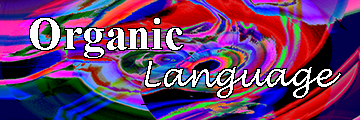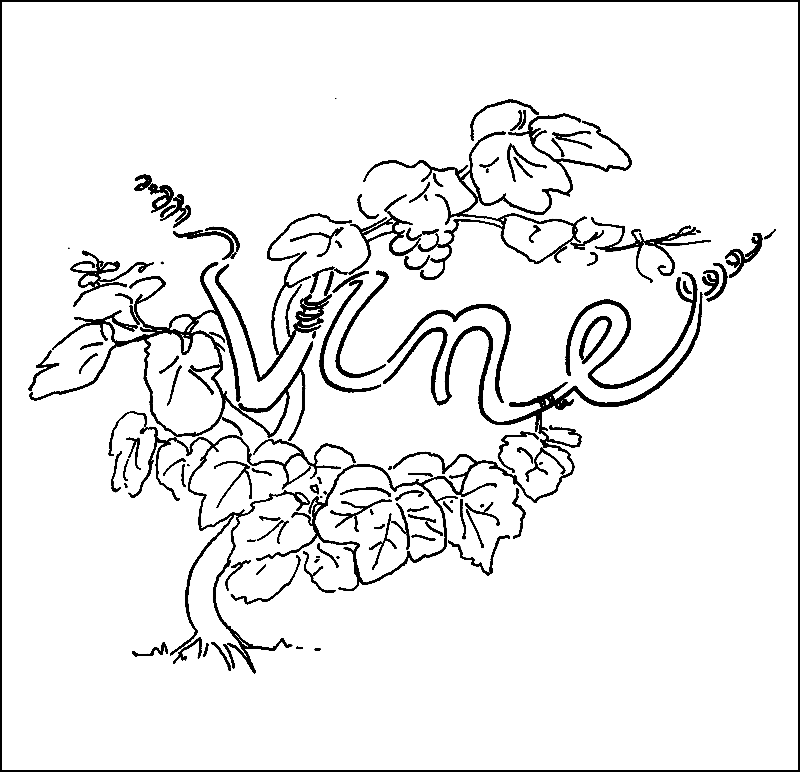



Contemporary theory suggests that:
1. We are born with the capacity to acquire1** a spoken language, but we have to learn how to read and write2**.
2. Writing is a technology that was invented to record spoken language.3** However, learning to read and write alters our natural perceptions of speech.
‘Organic Language’ is a book by Ian Bruce that presents a method for reawakening a natural perception of speech.
Example: the printed word ‘Vine’ presents a sequence of letters:
V - I - N - E.
This suggests that the word consists of a sequence of discrete sounds.
If you say the word ‘Vine’ out loud and slowly, you will notice that the resonance of the ‘i’ continues in the roof of the mouth whilst the ‘ne’ is happening below. There are at least two sounds happening at once. We do hear this, but we don't notice it, because we have been conditioned by exposure to the written word.


Example: the printed word ‘Vine’ presents a sequence of letters:
V - I - N - E.
This suggests that the word consists of a sequence of discrete sounds.
If you say the word ‘Vine’ slowly, you will notice that the resonance of the ‘i’ continues in the roof of the mouth whilst the ‘ne’ is happening below. There are at least two sounds happening at once. We do hear this, but we don't notice it, because we have been conditioned by exposure to the written word.
Humans have been speaking in languages for 100s of 1000s of years, whilst ‘writing’ only started developing a few of thousand years ago, purely as a technology for representing speech and allowing a record of an utterance to be passed through time. Widespread ‘literacy’ is between one and two hundred years old.
Gaining literacy moves our perception of language, ‘speech’, out of its natural habitat — the 4-D world of sound — into a 2-D visual-spatial realm*4*.
It is difficult for a literate person to think of a spoken word without its written form coming to mind.*5*
Literacy also affects many fundamental thought processes (see article Walter J. Ong). In particular, when words are moved into a visual-spatial realm their original emotional content is left behind, and comparison and reordering, (the processes of intellect), are facilitated. This imparts an orthodoxy to intellectual comprehension, distinct from the balance of emotion and intellect we find in speech.
‘Organic Language’ has four parts:
Part 1: presents a series of phonetic drawings. Extra-Pt1
Part 2: describes an approach to the mechanics of spoken language. Extra-Pt2
Part 3: experimental pieces that evoke an holistic meaning response. Extra-Pt3
Part 4: a summary of modern discoveries about language and brain function that support the ideas of Parts 1 & 2.*6* I suggest an approach to understanding how the sounds of English words relate to their meanings.Once you become sensitive to the vibrations of sound in your body when you speak, a whole new world of iconicity in English words opens up. This is very confronting at first as it conflicts with the conditioning we acquire in gaining literacy.
The List of References: contains the full quotations for the citations made in Parts 2 & 4.*7*
Only about 2% of literate people grasp the essence of these drawings easily and naturally — most find it difficult (if not impossible!). But I've witnessed quite astounding reactions from dyslexic individuals: the drawings seem to provide a conceptual bridge from the multi-dimensional, ‘real’ world of speech, to the improbable, flat formality of the printed word.
Download a 20 page sample of ‘Organic Language’
Navigation: Organic Language (this page), Part-1-extra, Part-2-extra, Part-3-extra
1. Pinker, Steven 1994, The Language Instinct, William Morrow, New York, p.20: “Darwin concluded that language ability is ‘an instinctive tendency to acquire an art,’ a design that is not peculiar to humans but seen in other species such as song-learning birds.” Back
2. Darwin, Charles 1871, The Descent of Man, John Murray, London, p.96: “ ... for man has an instinctive tendency to speak, as we see in the babble of our young children; while no child has an instinctive tendency to brew, bake or write.” Back
3. Ong, Walter J. 1982, Orality and Literacy, Methuen, London, p.8: “Written texts all have to be related somehow, directly or indirectly, to the world of sound, the natural habitat of language, to yield their meanings. 'Reading' a text means converting it to sound, aloud or in the imagination ...” Back
4. Ong, Walter J. 1982, Orality and Literacy, Methuen, London, p.12: “Though words are grounded in oral speech, writing tyrannically locks them into a visual field forever.” Back
5. Ong, Walter J. 1982, Orality and Literacy, Methuen, London, p.14: “For most literates, to think of words as totally dissociated from writing is simply too arduous a task ... The words keep coming to you in writing, no matter what you do.” Back
6. Acknowledgements: I am grateful to three luminaries in the linguistics, semiotics and neuro-psychology worlds for their permission to reproduce extended quotes from their published works in the List of References section: Dr Daniel Chandler, Aberystwyth University Wales, U.K.; Dr Daphne Maurer, McMaster University, Ontario, Canada; and Dr Steven Pinker, Harvard University, Massachusetts, USA. Back
7. Due to the immense subjectivity of language, ‘Organic Language’ is largely personal opinion. However, many of these opinions are now supported by modern research findings. Back
* * * * *
Links
Organic Language (this page)
Organic Language Part 1 extra
Organic Language Part 2 extra
Organic Language Part 3 extra